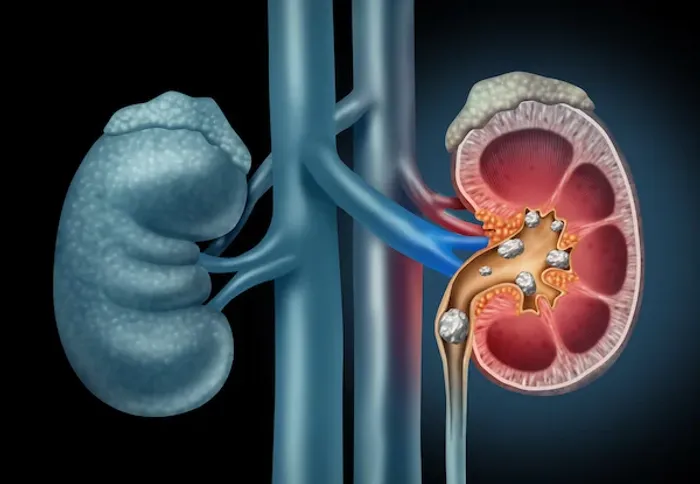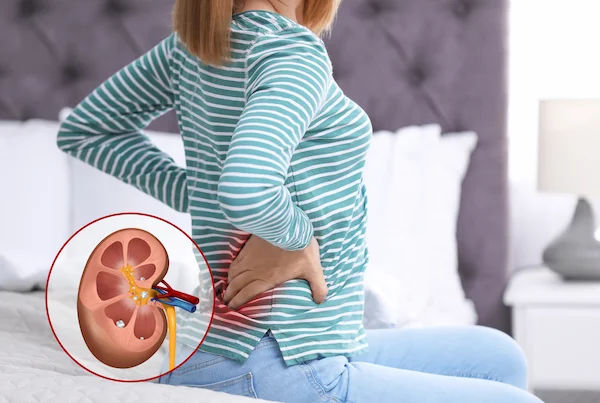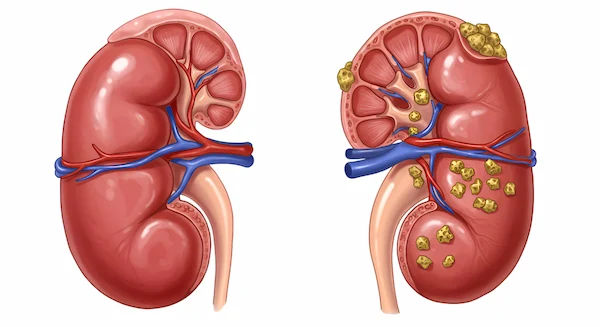Guide to Beer For Kidney Stones
Explore the relationship between beer and kidney stones. Learn whether beer can help in passing stones, its potential risks, and healthier alternatives for kidney health.

Written by Dr. Vasanthasree Nair
Reviewed by Dr. Rohinipriyanka Pondugula MBBS
Last updated on 13th Jan, 2026

Introduction
If you've ever suffered through the excruciating pain of a kidney stone, you've likely heard the old wives' tale: "Drink a beer to help pass it." This piece of folk wisdom has been passed down for generations, suggesting that the common beverage can be a surprising home remedy. But is there any scientific truth to this claim, or is it a dangerous myth? This guide dives deep into the complex relationship between beer and kidney stones, separating fact from fiction. We'll explore the potential mechanisms behind the theory, the significant risks involved, and what medical experts actually recommend for both prevention and treatment. Understanding the science is crucial, as mismanaging kidney stones can lead to serious complications. Let's pour out the truth about this controversial topic.
Understanding Kidney Stones: The Basics
Kidney stones are hard deposits made of minerals and salts that form inside your kidneys. They can affect any part of your urinary tract, often causing severe pain when they move or block the flow of urine.
What Are Kidney Stones Made Of?
Understanding the type of stone you have is critical, as it directly influences dietary recommendations, including whether beer consumption is advisable.
Calcium Oxalate Stones: The most common type, formed from calcium and oxalate.
Uric Acid Stones: Form when urine is too acidic. A diet high in purines can increase uric acid levels.
Struvite Stones: Often formed in response to a urinary tract infection.
Cystine Stones: These are rare and tend to run in families.
Consult Top Nephrologists
The Theory: Why Do People Think Beer Helps?
The belief that beer for kidney stones is beneficial isn't entirely without a logical, albeit oversimplified, basis. The theory hinges on two main properties of beer.
The Diuretic Effect
Alcohol is a diuretic, meaning it promotes the production of urine. The idea is that by increasing urine volume, you might "flush out" a small, stuck kidney stone more quickly. This increased flow could theoretically help move the stone along the urinary tract.
The Hydration Factor
Beer is largely composed of water. Consuming any fluid, in theory, helps dilute the urine and reduce the concentration of the minerals that form stones. In this sense, the water in beer could contribute to overall hydration.
The Reality: Significant Risks and Drawbacks
While the theory seems plausible, in practice, using beer as a remedy is fraught with risk and is not supported by urologists or nephrologists.
Dehydration: The Primary Danger
This is the biggest flaw in the theory. While beer makes you urinate more, it can actually lead to net dehydration. Alcohol inhibits vasopressin, an antidiuretic hormone, causing your kidneys to remove water from your blood much faster than with other liquids. For someone already in pain and potentially nauseous, this dehydration can worsen the situation and concentrate the urine, potentially making stone formation worse.
High Purine Content
This is a critical point for stone formers. Many beers, particularly craft beers like IPAs and stouts, are high in purines. Purines are chemical compounds that the body breaks down into uric acid. High levels of uric acid in urine are a primary cause of uric acid kidney stones and can also contribute to calcium stones. Therefore, drinking beer can directly contribute to the creation of new stones.
Empty Calories and Weight Gain
Obesity is a known risk factor for kidney stones. Beer is calorie-dense (often called "empty calories"), and regular consumption can lead to weight gain, thereby indirectly increasing your long-term risk for developing stones.
What Does the Research Say?
The scientific evidence is mixed and often misrepresented.
Some large observational studies, like the CLUE II study, found an inverse association between beer consumption and kidney stone risk, meaning beer drinkers had a slightly lower risk. However, this is likely correlation, not causation. It may be that people who drink beer in moderation also have other lifestyle factors that reduce risk.
These studies do not prove that beer is an effective treatment for an existing stone.
The same studies show that sugar-sweetened sodas are associated with a higher risk, highlighting that what you drink matters immensely.
Safer and More Effective Alternatives to Beer
If your goal is to prevent or help pass a stone, there are far more effective and safer strategies than turning to alcohol.
Water: The Gold Standard
The single most important recommendation from every urologist is to drink plenty of water. Aim for 2-3 liters per day to produce at least 2.5 liters of urine. This keeps your urine dilute and minimizes the chance of crystals forming and aggregating into stones.
Lemon Juice and Citrate
Lemonade (real lemon juice, not sugary mix) is often recommended. Citrate in lemon juice binds to calcium in the urine, preventing the formation of calcium oxalate crystals. It also helps break down small stones. Your doctor may even prescribe potassium citrate supplements.
Dietary Modifications
Your diet should be tailored to your specific stone type, which requires proper kidney stone diagnosis.
For Calcium Oxalate Stones: Reduce sodium and oxalate-rich foods (spinach, nuts, rhubarb).
For Uric Acid Stones: Reduce purine-rich foods (red meat, organ meats, shellfish, and beer).
When to Absolutely Avoid Beer
There are clear scenarios where drinking beer is unequivocally a bad idea:
If you are currently experiencing kidney stone pain or are trying to pass a stone.
If you have a history of uric acid stones.
If you are on medication for pain or other conditions.
If you have any underlying liver or kidney disease.
If your condition does not improve after trying hydration and pain management, book a physical visit to a doctor with Apollo24|7 for imaging and professional treatment options.
Conclusion
The idea of using beer for kidney stones is a persistent myth that blurs the line between cautious correlation and dangerous causation. While some population studies suggest a modest preventive benefit for moderate drinkers, this is overwhelmingly attributed to the fluid content rather than the alcohol. The risks of using beer as an active treatment—namely dehydration and its high purine content far outweigh any unproven theoretical benefits. The cornerstone of kidney stone prevention and management remains proper hydration with water, dietary modifications based on your specific stone type, and guidance from a medical professional. Don't gamble with your health based on folklore. If you are prone to stones or are experiencing symptoms, consult a doctor to develop a safe, effective, and personalized plan. Your kidneys will thank you.
Consult Top Nephrologist
Consult Top Nephrologists

Dr Anupam Bahl
Nephrologist
15 Years • MBBS DNB(General Medicine) DNB(Nephrology)
Delhi
Apollo Hospitals Indraprastha, Delhi
(25+ Patients)

Dr. Manju Kamal
Nephrologist
12 Years • MBBS,MD(General Medicine), DNB,DM(Nephrology)
Angamaly
Apollo Hospitals Karukutty, Angamaly

Dr Vinay Kumar A V
Nephrologist
8 Years • MBBS, MD - General Medicine, DM - Nephrology
Bilaspur
Apollo Hospitals Seepat Road, Bilaspur

Dr. S. Anil Kumar Patro
Nephrologist
14 Years • MD, DNB
Chinagadila
Apollo Hospitals Health City Unit, Chinagadila
(25+ Patients)

Dr. Pranab Kumar Medhi
Nephrologist
20 Years • MBBS, MD(Medicine), IDCCM(Critical Care Medicine), DM(Nephrology)
Guwahati
Apollo Hospitals G S Road, Guwahati
Consult Top Nephrologist

Dr Anupam Bahl
Nephrologist
15 Years • MBBS DNB(General Medicine) DNB(Nephrology)
Delhi
Apollo Hospitals Indraprastha, Delhi
(25+ Patients)

Dr. Manju Kamal
Nephrologist
12 Years • MBBS,MD(General Medicine), DNB,DM(Nephrology)
Angamaly
Apollo Hospitals Karukutty, Angamaly

Dr Vinay Kumar A V
Nephrologist
8 Years • MBBS, MD - General Medicine, DM - Nephrology
Bilaspur
Apollo Hospitals Seepat Road, Bilaspur

Dr. S. Anil Kumar Patro
Nephrologist
14 Years • MD, DNB
Chinagadila
Apollo Hospitals Health City Unit, Chinagadila
(25+ Patients)

Dr. Pranab Kumar Medhi
Nephrologist
20 Years • MBBS, MD(Medicine), IDCCM(Critical Care Medicine), DM(Nephrology)
Guwahati
Apollo Hospitals G S Road, Guwahati
More articles from Kidney Stone
Frequently Asked Questions
Does drinking beer actually dissolve kidney stones?
No, beer does not dissolve kidney stones. While its diuretic effect may increase urine flow, it does not contain any compounds that actively break down existing stones. Specific medications like potassium citrate or medical procedures are required to dissolve or remove stones.
What is the best drink to flush out kidney stones?
Water is unequivocally the best and safest drink. Sugar-free lemonade or limeade is also beneficial due to its citrate content, which can help prevent certain types of stones from forming and may help break down small ones.
Can I drink beer if I am prone to kidney stones?
It depends on the type of stones you form. If you form uric acid stones, you should avoid or strictly limit beer due to its high purine content. For other stone types, moderation is key, but water should always be your primary fluid. It's best to discuss this with your urologist.
How much water should I drink to prevent kidney stones?
Most urologists recommend drinking enough water to produce 2 to 2.5 liters of urine per day. This typically means consuming 2.5 to 3 liters (about 8-10 glasses) of fluids, primarily water, throughout the day.
What are the first signs of passing a kidney stone?
The first signs often include severe, sharp pain in the back or lower abdomen that comes in waves, pain or a burning sensation during urination, pink, red, or brown urine (hematuria), a persistent need to urinate, and nausea or vomiting.

